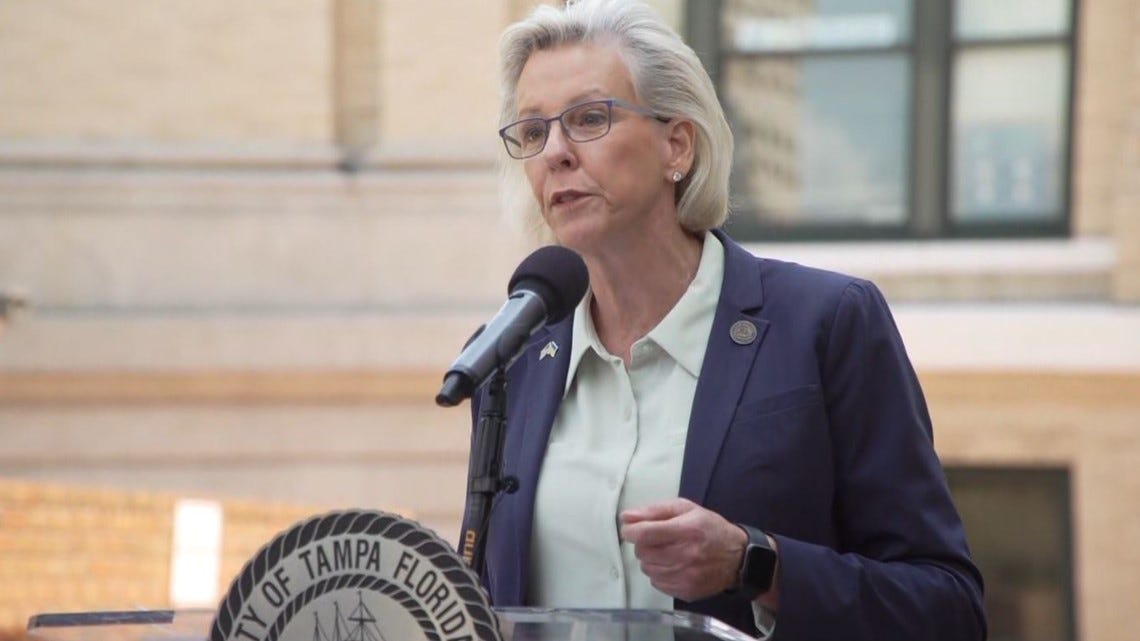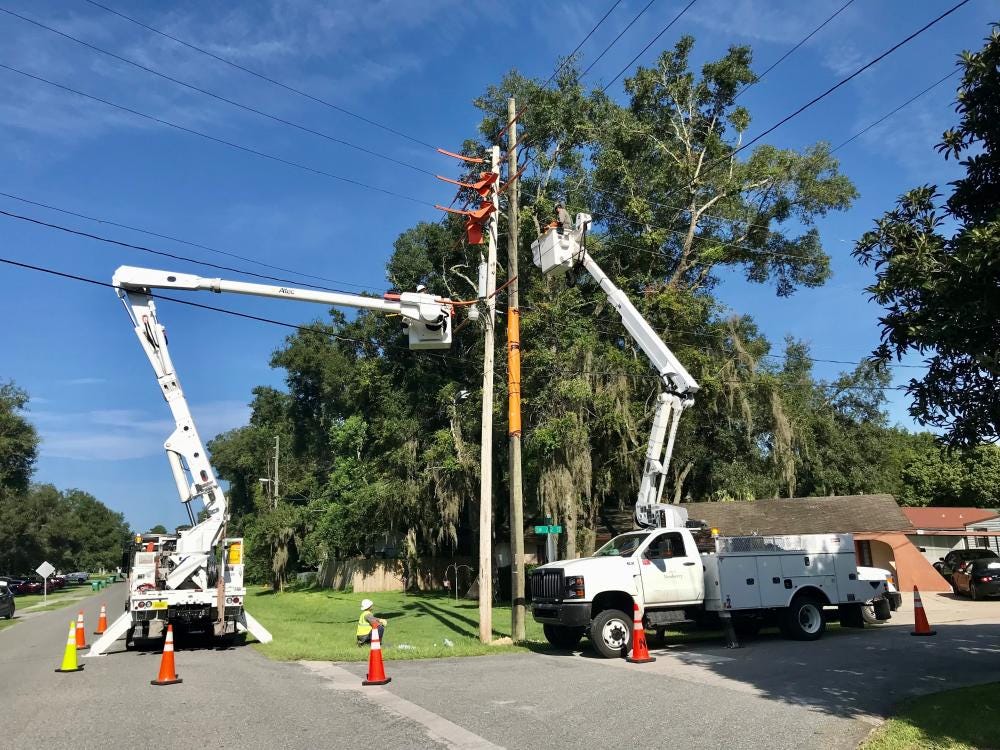2024 brings new laws to Florida & lawmakers seek to end three-day waiting period to purchase firearms
January 4, 2024 — This Week's Top Stories in Florida
Welcome to this week’s edition of Floridian Today, a newsletter about all things Florida — from politics, business, real estate, and climate. Reporting from the Sunshine State, these are the most important stories you need to know. To never miss an update, subscribe here:
Here’s the latest from Florida…
New laws take effect in Florida
As Floridians begin 2024 with a series of personal resolutions and lofty goals, the new year also marks the beginning of several new laws taking effect, impacting various aspects of daily life for residents and visitors. Starting on January 1:
Drivers will have to move over one lane – or lower their speed – for any disabled vehicle stopped along the side of the road. The changes expand the state’s 2002 Move Over law beyond the existing requirement that motorists switch lanes or slow down for any law enforcement, emergency, and utility vehicles, tow trucks, and construction vehicles approached on the side of the road. Violators could face fines up to $158.
The year will begin with a two-week back-to-school sales tax holiday that allows consumers to make tax-free purchases on items like clothes, school supplies, learning aids, and electronics until January 14.
Florida’s Department of Children and Families will be responsible for handling child abuse investigations statewide, absorbing the task from seven counties in which their respective sheriff’s offices have managed such investigations since 1998. DCF will take over the sheriff's office responsibilities from Broward, Hillsborough, Pinellas, Pasco, Seminole, Manatee, and Walton counties.
The “Protect Our Loves One Act” will be implemented that enables local law enforcement agencies to establish a registry of individuals with special needs, including autism, cerebral palsy, spina bifida, intellectual disabilities, Alzheimer’s disease, and Down syndrome, among others. This will provide officers with a new tool that will better inform their encounters with those who possess mental health issues or physical disabilities at times of crisis. Individuals can be voluntarily enrolled in the registry.
A new law mandates that only a judge can set, reduce, or alter bail for a defendant. It also requires the Florida Supreme Court to establish a uniform bond schedule statewide, and restricts a judge from setting a lower amount unless a chief judge in any one of the state's 20 judicial circuit courts requests permission to set a lower bond amount than prescribed in the statewide schedule.
New pretrial detention rules take effect that prohibit a defendant accused of committing a violent or dangerous crime from being released before their first hearing. A court is also authorized to revoke pretrial release and order a defendant to pretrial detention if any condition of pretrial release is violated. A court is also forbidden from granting nonmonetary pretrial release at a first hearing if a defendant is arrested for a dangerous crime and probable cause exists to believe the individual committed the offense.
The year-long SunPass program offering frequent toll-road motorists up to 50% credits if they make 35 or more toll-road trips a month will conclude, affecting more than 1.2 million drivers who benefitted from the toll relief program and saved over $300 million.
The list of companies with which state agencies and local governments are barred from investing in or conducting business is expanded, with additional restrictions on companies with ties to Iran.
Another new law impacts elected municipal officials, including mayors, who must now submit more detailed financial disclosures, known as Form 6, requiring their sources of income, net worth, assets over $1,000, and liabilities to be reported in annual filings.
Floridians will also be able to reserve campsites at any of the 175 state parks 11 months in advance – one month before non-residents can book reservations.
Businesses in Florida that provide worker’s compensation coverage will pay an average of 15.1% less in insurance rates, based on the stable worker’s compensation market in the state and positive loss experiences during the 2020 and 2021 years.
The KidCare subsidized health insurance program is expanding eligibility and will experience changes in premium tiers based on household incomes.
Other headlines to know…
Lawmaker proposes ending three-day waiting period to purchase rifles, shotguns
Florida State Senator Jonathan Martin (R-Fort Myers) has proposed a bill (SB 1124) to eliminate the statewide three-day waiting period for purchasing rifles or shotguns, excluding handguns. Existing law requires a three-day waiting period or the time taken to complete a mandatory criminal background check, whichever is later. Supporters of the proposal argue the change benefits law-abiding citizens experiencing prolonged delays in background checks, while critics, including gun control advocates, express concerns about quick access to firearms, arguing they reduce suicides, homicides, and can curtail mass shootings.
Florida misses out on $248M in federal aid to feed low-income children
Millions of Florida children who rely on school meals may face hunger next summer as the state declined to apply for $248 million in federal aid. The state's Department of Children and Families (DCF) neglected to pursue the funding for the Summer EBT Program, part of the Supplemental Nutrition Assistance Program (SNAP, formerly known as food stamps), providing healthy meals during the summer to children who receive free or reduced-cost lunches during the school year. About 2 million Florida students take advantage of the program every year. While 25 states signed up before the January 1 application deadline, state officials refused to designate an agency to administer the program. DCF claims existing state-run programs are sufficient without any additional federal programs, criticizing the “federal strings attached” to such financial aid. Joining the Summer EBT Program would require the state to chip in $12 million annually for admin costs, but the state budget lacks any allocated funds for this purpose. Advocates warn the missed funding opportunity would cost the state hundreds of millions of dollars and create potential gaps in existing meal programs. Under the program, Florida would be obligated to provide a 50% match for administrative costs, equating to around $12 million per year.
Tampa Mayor Jane Castor faces criticism on her promise to deliver 10,000 affordable homes
Shortly after taking office in 2019, Tampa Mayor Jane Castor made an oft-repeated promise to add 10,000 affordable homes by the end of 2027. Her administration is now facing scrutiny as city records show a significant gap between her claims and reality, per a review by the Tampa Bay Times. The official count stands at 5,242 homes, almost 13% fewer than the 6,000 affordable homes added to the housing stock that Castor frequently asserted during her reelection campaign. Further analysis by the Times reveals exaggerations and misrepresentations, such as counting homes in the planning stages, including developments outside city limits, and crediting maintenance projects as new construction. While critics argue the discrepancy undermines trust, Castor disputed the findings but acknowledged challenges in meeting the 10,000 homes goal due to population growth, rising construction costs, elevated interest rates, and a commitment among developers and nonprofit organizations.
Florida sets record for space launches in 2023
In a groundbreaking year for space exploration, Cape Canaveral set a new record with 69 launches in 2023, surpassing the previous year's record of 57. The Kennedy Space Center and Cape Canaveral Space Force Base saw a surge in activity, showcasing not just the quantity but the technological advancements driving the commercial spaceflight sector. SpaceX, in particular, achieved remarkable feats, launching two rockets in a single day—a capability deemed unthinkable just a few years ago. Improved rocket technology and efficient computer software have contributed to shorter turnaround times between missions, addressing concerns about bottlenecks. The increased launch frequency is shaping the future of low-Earth orbit infrastructure and its buildout. The moon will be the focus of launches in 2024, which is anticipated to culminate with the Artemis II mission, sending four astronauts to conduct a flyby in the first crewed flight beyond low earth orbit in more than 50 years.
Tampa Bay’s largest real estate transactions exceed $1B
The real estate market in Tampa Bay witnessed over $1 billion in transactions during 2023, with the highest-grossing deal being the sale of Westfield Brandon Mall for $220 million. Despite a slowdown compared to the previous year's $2 billion in commercial sales, the region demonstrated resilience amid national challenges. The top 20 deals included notable transactions like the $203.9 million sale of the 774-unit Bell Lansbrook Village, the $123 million Urban Centre purchase by Ally Capital Group, and Praedium Group's $108.6 million acquisition of Rowan Pointe. Industry experts suggest cautious optimism for 2024, anticipating improvements in real estate markets with easing inflation and potential interest rate reductions.
State lawmakers propose legislation blocking businesses from going cashless
Florida lawmakers are considering a bill that would prohibit most businesses from going cashless, ensuring consumers have the choice to pay with cash. While some restaurants and shops predominantly use credit or debit cards for transactions, the proposed legislation aims to address concerns that a cashless approach could exclude certain demographics from the economy. State Rep. Anna Eskamani (D-Orlando) acknowledged the need to balance innovation but emphasized the importance of not leaving behind the working class and elderly who may not have easy access to digital payment methods. The bill also allows specific retail businesses, like parking lots, to adopt a card-only policy for safety reasons. The proposal has bipartisan support in the state House and Senate.
So, who’s moving to Florida?
The Sunshine State is witnessing a significant influx of millennials and Gen Xers earning around $55,000, particularly from states like New York and California, according to an analysis of individual-level data from the Census Bureau's 2022 American Community Survey by Business Insider. The appeal of Florida lies in its lack of state income tax, favorable weather, retirement opportunities, and a laid-back lifestyle. A substantial 23.9% of movers are boomers, often relocating for retirement, while millennials constitute the largest group at 29.3%. Despite the economic gains, with an average income of $55,115.48, 37.4% are not part of the labor force. Over 49% of movers are homebuyers, contributing to Florida's housing boom, but this influx has also led to housing and affordability challenges in certain areas. Between 2021 and 2022, 739,000 people moved to Florida, according to the data.
Floridians to see lower energy bills in 2024
Florida residents are expected to see a decline in their electric bills in 2024 as major private utilities, including Florida Power & Light (FPL), Duke Energy Florida, and Tampa Electric Co. (TECO), plan to reduce costs. The lower bills are attributed to a decrease in natural gas prices, a significant factor in the utilities' costs as Florida-based energy companies are heavily reliant on natural gas to fuel electric-generating power plants. High gas prices in 2022 led to increased bills in 2023, but with the decline in fuel costs since the highs in 2022, customers can expect relief. The utilities, such as Tampa Electric and Duke, will also spread out costs incurred from hurricane-related power restoration from Hurricane Idalia last year as well as earlier storms such as Ian in 2022, and Michael in 2018. For example, the $91.9 million in restoration costs spent by Duke Energy statewide following Hurricane Idalia will be assessed on Florida customers throughout 2024 and subsequent years, adding to the existing balance in collections from earlier storms. Spreading out these restoration costs over a longer period will lessen the immediate impact on customers’ monthly bills. In 2024, FPL customers using 1,000 kilowatt hours can expect to pay $135.51 in January, down from the current $136. Then, such bills will decrease to $128.86 in April due to the end of storm-related charges. Likewise, TECO customers using 1,000 kilowatt hours will pay $143.48 in January, down from the current $161.13. Duke customers in the same category will see bills at $171.71, reduced from $183.
Thanks for reading this edition of Floridian Today. To never miss an update, subscribe for free:
In the meantime, if you learned something or found this read interesting, please consider sharing it to grow our community!







